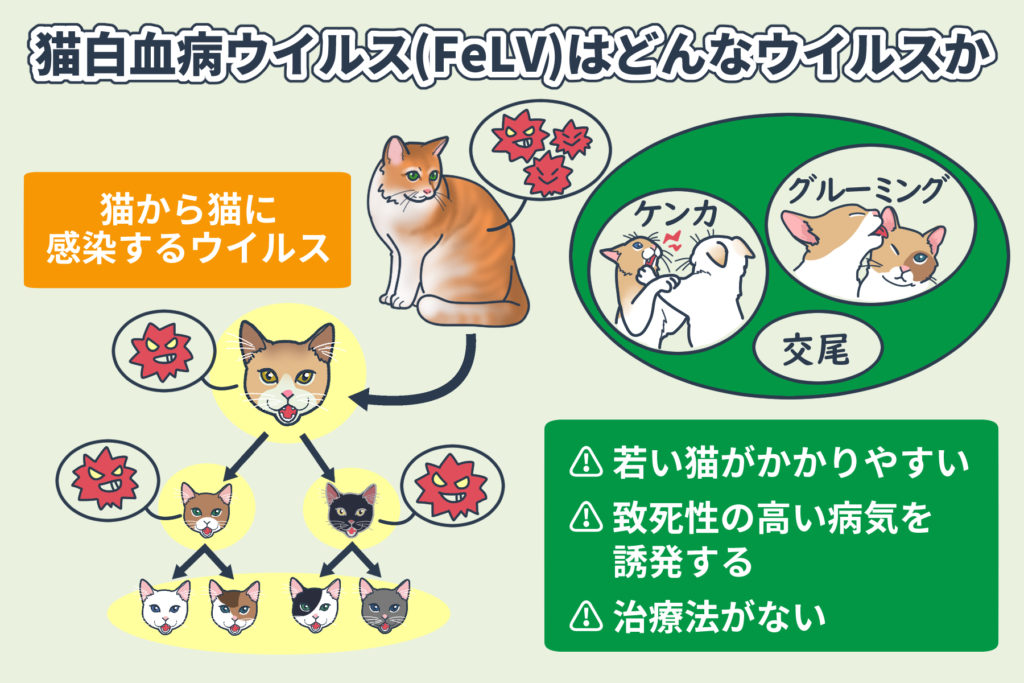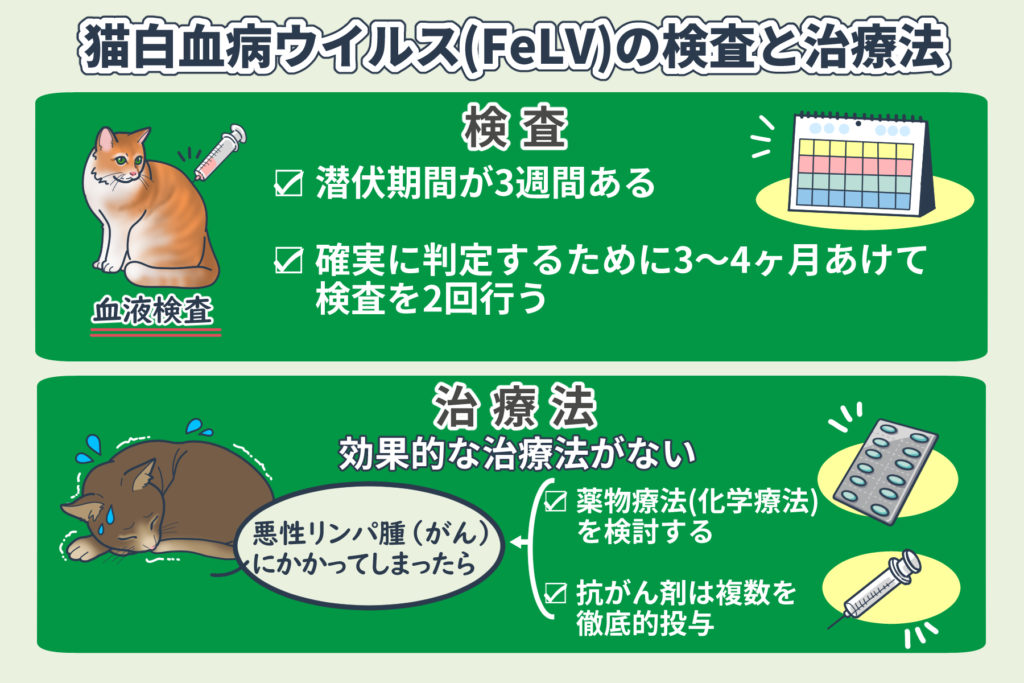・Preventing Feline Leukemia Virus (FeLV) involves avoiding infection, preventing the virus from establishing itself in the body, and preventing disease manifestation even if infected.
・Even if a cat is infected with Feline Leukemia Virus (FeLV), it can live a full life without developing lymphoma if it has a strong immune system.
目次
What is Feline Leukemia Virus (FeLV)?

Cats can infect each other through fighting, mating, and grooming. Because it is relatively easy to transmit, in multi-cat households, all cats might become infected. Rest assured, humans and dogs do not need to worry about contracting this virus.
This Feline Leukemia Virus is quite troublesome. The main reasons are the following two points:
- It induces fatal diseases such as lymphoma.
- There is no treatment to eliminate the Feline Leukemia Virus from the body.
It is known that younger cats are more susceptible to infection and more likely to develop diseases such as lymphoma compared to adult cats.
Lymphoma that develops in young cats has an extremely high mortality rate, and the goal of treatment becomes extending the cat’s life as much as possible.
Examinations and Treatment

It is crucial to test your cat to know if they are infected with the feline leukemia virus.
This is important because you need to prevent unknowingly spreading it to other cats.
Unfortunately, there is no effective treatment available.
Testing
A blood test can determine if your cat is infected.
However, it cannot be detected immediately after infection.
It is common to get tested again after 3-4 months.
It is believed that you need to test twice to make a definitive diagnosis.
You should also get your cat tested when considering vaccination against feline leukemia.
If your cat is already infected, the vaccine will be ineffective. Furthermore, the safety of vaccinating already infected cats is unknown.
You may also need to test if your cat develops malignant lymphoma.
Treatment
If malignant lymphoma develops, chemotherapy with anticancer drugs and steroids may be considered.
Typically, a comprehensive approach with multiple anticancer drugs is used, rather than minimal doses, to aim for remission.
We propose treatments with supplements, diet, and nutrition.
Believe it or not, remission can sometimes be achieved without chemotherapy.
Malignant Lymphoma, a Severe Illness Caused by the Feline Leukemia Virus
Malignant lymphoma in cats is the most severe disease caused by feline leukemia virus infection—essentially, it is cancer.
- Loss of appetite
- Weight loss
These symptoms gradually worsen as lymphoma progresses.
If the lungs are affected, pleural effusion may occur, leading to coughing and breathing difficulties, making the condition tough for both cats and their owners.
Please refer to the related page as well.
- Feline Leukemia Virus Infection – Be Alert for Lymphoma Development
- Feline AIDS Virus Infection – FIV Onset, Symptoms, Treatment Methods, and Overcoming Tips
- Feline Infectious Peritonitis (FIP) – Coronavirus Infection, Symptoms, and Tips for Improvement and Cure
- Diseases, Symptoms, and Treatments Preventable by Core Vaccines for Cats
- Overcoming Cancer in Cats – Types of Cancer, Causes, Symptoms, Treatments, and Tips for Overcoming Cancer
Prevention Methods for Feline Leukemia Virus (FeLV)

Prevent Infection with Feline Leukemia Virus.
Feline leukemia can be transmitted through saliva, urine, tears, breast milk, blood, and the placenta. Airborne transmission is less common, but infection can occur through grooming and sharing dishes with an infected cat.
The risk of infection increases with close contact such as fighting or mating.
The most reliable prevention method for Feline Leukemia Virus infection is to avoid contact with infected cats. Keeping your cat indoors significantly reduces the risk of infection. In multi-cat households, if one cat is infected, it is crucial to keep that cat in a separate room and thoroughly disinfect dishes and other items to prevent FeLV from spreading to other cats.
Additionally, neutering or spaying can eliminate the risk of transmission through mating.
The decreased aggression reduces the likelihood of fighting, thereby lowering the risk of infection.
There are other benefits to neutering and spaying as well.
Of course, there are also disadvantages, so consult your veterinarian thoroughly.
Although preventing disease is important, removing healthy organs can be a concern for many. Ensure you understand and agree before proceeding with the surgery.
There is a preventive vaccine available for Feline Leukemia Virus.
However, vaccination does not provide 100% protection against infection. Rarely, side effects may occur.
Moreover, if the cat is already infected, the vaccine is not effective and its safety is not established. Make sure to have a test done before vaccination.
Prevent the Virus from Establishing an Infection Even if It Enters the Body.
Some cats get infected, while others do not. Is this just a twist of fate?
No, it is not.
If it were, the feline leukemia virus would be much more widespread.
The most significant factor influencing infection is immunity.
If a cat’s immunity is strong, the cat is less likely to get infected.
The previously mentioned feline leukemia vaccine also works to prevent infection by educating the immune system.
Always keep your cat in good health, boost its immunity, and create an internal environment resistant to viruses.
Provide a good diet above all else.
If your cat is weak, provide supplements.
This is not limited to feline leukemia virus but is a measure against various infections. It is also the secret to a long and healthy life.
For more information on diet, please refer to this article. Although the article is written for dogs and cats with cancer, the principles are the same.
A strong body houses a strong immune system.
Even if infected, prevent the onset of the disease.
If the virus’s proliferation is continuously prevented, there is a possibility that the cat can go through life without ever developing the disease.
Again, immunity plays a strong role in this. Start working on building a strong body.
Injuries, other viral infections, or bacterial infections can potentially activate the feline leukemia virus.
The activation of the virus can lead to the onset of lymphoma, so it is also important to keep the cat in a safe and sanitary environment.
It may be surprisingly important to frequently replace food and water.
Measures Against Feline Leukemia Virus (FeLV)
Even if a cat is infected with the feline leukemia virus (FeLV), if its immunity is strong, it can live a lifetime without developing lymphoma or other diseases.
When a cat is infected with FeLV, it is crucial to implement immune measures and provide the necessary nutrients.
As part of immune measures, research is being conducted with the expectation of improving QOL (quality of life) by combining Cordy with Krill Oil, which is rich in EPA/DHA extracted from Antarctic krill for anti-inflammatory measures.
Please feel free to contact us if you have any questions.
The following specific type of Cordyceps fungus, expected to have immune-regulating functions, is also being researched for its applications in humans.
監修獣医師:林美彩 所属クリニック:chicoどうぶつ診療所

代替療法と西洋医学、両方の動物病院での勤務経験と多数のコルディの臨床経験をもつ。 モノリス在籍時には、一般的な動物医療(西洋医学)だけでは対応が困難な症例に対して多くの相談を受け、免疫の大切さを痛烈に実感する。
ペットたちの健康維持・改善のためには薬に頼った対処療法だけではなく、「普段の生活環境や食事を見直し、自宅でさまざまなケアを取り入れることで免疫力を維持し、病気にならない体づくりを目指していくことが大切である」という考えを提唱し普及活動に従事している。
所属:
- Feline Leukemia Virus Infection – Pay attention to lymphoma development with FeLV
- Feline AIDS Virus Infection – Onset, symptoms, treatment, and overcoming methods for FIV
- Feline Infectious Peritonitis (FIP) – Coronavirus Infection, Symptoms, and Tips for Improvement and Recovery
- Diseases Preventable by Core Vaccines in Cats, Symptoms, and Treatments
- Overcoming Cancer in Cats – Types of Cancer, Causes, Symptoms, Treatments, and Tips for Overcoming Cancer






